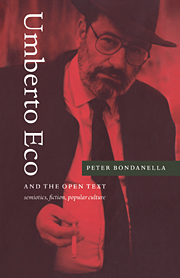Book contents
- Frontmatter
- Contents
- Preface
- ONE Umberto Eco's intellectual origins: medieval aesthetics, publishing, and mass media
- TWO The Open Work, Misreadings, and modernist aesthetics
- THREE Cultural theory and popular culture: from structuralism to semiotics
- FOUR From semiotics to narrative theory in a decade of radical social change
- FIVE “To make truth laugh”: postmodern theory and practice in The Name of the Rose
- SIX Interpretation, overinterpretation, paranoid interpretation, and Foucault's Pendulum
- SEVEN Inferential strolls and narrative shipwrecks: Six Walks and The Island of the Day Before
- EIGHT Conclusion
- Bibliography
- Index
FIVE - “To make truth laugh”: postmodern theory and practice in The Name of the Rose
Published online by Cambridge University Press: 23 October 2009
- Frontmatter
- Contents
- Preface
- ONE Umberto Eco's intellectual origins: medieval aesthetics, publishing, and mass media
- TWO The Open Work, Misreadings, and modernist aesthetics
- THREE Cultural theory and popular culture: from structuralism to semiotics
- FOUR From semiotics to narrative theory in a decade of radical social change
- FIVE “To make truth laugh”: postmodern theory and practice in The Name of the Rose
- SIX Interpretation, overinterpretation, paranoid interpretation, and Foucault's Pendulum
- SEVEN Inferential strolls and narrative shipwrecks: Six Walks and The Island of the Day Before
- EIGHT Conclusion
- Bibliography
- Index
Summary
When Eco published his first work of prose fiction in September 1980, a novel with a medieval setting, no one (least of all the author himself) could have imagined its unparalleled international success. Within Italy, of course, Eco was extremely well known to the educated public because of the fame of his earlier theoretical works on popular culture, narrative theory, and semiotics. In addition, he continued a long collaboration with the major Italian news magazine, L'Espresso, that had begun in 1965 and would eventually include providing the magazine with a high-profile weekly column (“La bustina di Minerva”) every week. Eco had also guaranteed himself a substantial following in Italian universities by publishing a popular guide to the preparation of humanistic theses required for graduation from these institutions of higher learning in Italy, a publication equal in popularity to the MLA Handbook or the Chicago Manual of Style in the United States: Come si fa una tesi di laurea: Le materie umanistiche (How to Write a Doctoral Thesis: The Humanistic Subjects, 1977). Critical approval of Eco's novel inside the peninsula with the award of the prestigious Premio Strega in 1981 was therefore not so surprising. But the absolutely unprecedented popular reception of this book both inside Italy and abroad with sales of tens of millions of copies all over the world and translations in some thirty different languages was impossible to imagine. For Eco's severest critics, the “apocalyptical” intellectuals who were suspicious of any other intellectual they suspected of gaining fame through an interest in popular culture, Eco's international success only confirmed their suspicion of the direction of his intellectual development.
- Type
- Chapter
- Information
- Umberto Eco and the Open TextSemiotics, Fiction, Popular Culture, pp. 93 - 125Publisher: Cambridge University PressPrint publication year: 1997



